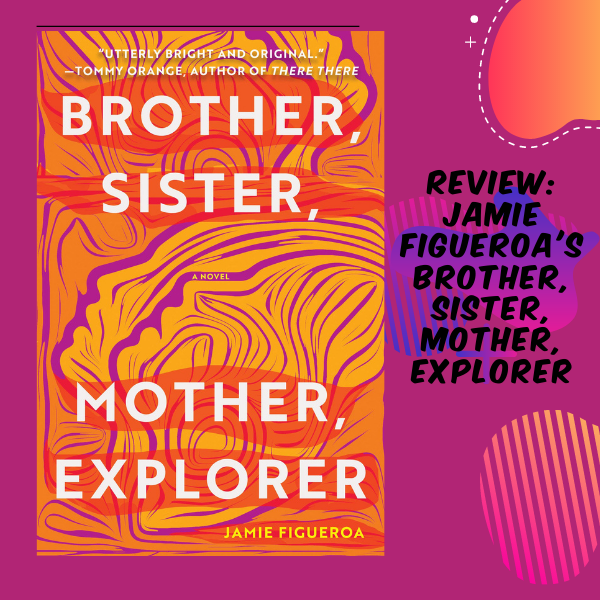Brother, Sister, Mother, Explorer is the debut novel of Jamie Figueroa. Her bio on her website states that she is “Boricua (Afro-Taíno) by way of Ohio and long-time resident of northern New Mexico.” Boricua is a person from Puerto Rico by birth or descent and the Taíno “were an Arawak people who were the indigenous people of the Caribbean and Florida.” The novel is set in the tourist town of Ciudad de Tres Hermanas (translated as the City of Three Sisters) over a weekend.
The title refers to four characters in the novel. The Brother is Rafa, a few weeks shy of thirty. His Sister is Rufina, twenty-eight. Their Mother is Rosalind; they buried her four months ago. The Explorer was a father figure who lived with them for a few years while Rafa and Rufina were growing up. Rafa and Rufina spend this weekend together in their childhood home. Rufina bets Rafa that if they make enough money for a plane ticket by performing for tourists in the plaza, then Rafa must live. If not, then she will agree to whatever he decides for his future. The novel focuses on the present with a host of other characters and the siblings’ performance, interspersed with flashbacks to their childhood. Rosalind’s ghost also appears in the present and her journey across the borders and her struggles as a single mother is narrated in flashbacks. There is also a genderless angel who tries to salvage the lives of Rafa and Rufina. And lastly, there is the child that Rufina lost who also appears and is taken away by the angel.
Despite the simple lyrical language, the reader is transported to Ciudad de Tres Hermanas with similarities to Santa Fe. The reader glimpses the display of the privilege of the tourists who visit, the remains of colonization, and casual and systemic racism. The city is a living testament to colonization and depends on the tourists. I usually pick one side when I read narratives set in multiple timelines. However, this novel provides a compelling story in both the present timeline and the flashbacks. Other themes include intergenerational trauma from Rosalind to her children, metaphorical and literal abandonment, and the delicate dynamics of a family especially if you are trying to create one from the ruins of the past, while also trying to form something new.
The relationships form the main crux of the novel but there are also a lot of things happening. If you want to take a trip to the Southwest and understand the nuance of relationships, immigration, all in a magical realistic setting, then this is a perfect book. Content warning: sexual assault.

